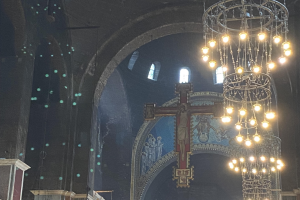Reflection on academisation of Catholic schools

Photo by Agence Olloweb on Unsplash
Over recent years, the debate around academisation has become increasingly polarised, with some arguing passionately against while others regard it as an essential step towards school improvement. I aim to contribute to this debate, not to add to the increasingly entrenched views on each side, but rather to advocate for a view that takes into account context that schools are currently operating in and the nuances of individual schools and diocese.
I have read with interest the recent numerous articles regarding school standards, academisation, curriculum, governance and particularly the future strategic direction of our Catholic School's voluntary aided and Academies.
I am a recently retired Secondary Headteacher who began his career in 1979. I was Headteacher of two secondary schools in two different dioceses, Portsmouth and Westminster, and two very different local authorities, Hampshire and the London Borough of Hillingdon.
In 1979 James Callaghan had recently made his crucial 'Ruskin speech' - he observed the "secret garden" of the English and Welsh education system and not in a complimentary way. The last time prior to 1979 that education, its purpose and structures was debated at national level culminated in the 1944 Education Act. Clearly, the context by 1979 was somewhat different.
It would be convenient to hope for a return to those heady days of the 60s and 70s. A significant school building and expansion programme had taken place; most parts f the country had reorganised their secondary school along comprehensive lines; and the school-leaving age had been raised to 16. Public examinations had barely changed in the previous 25 years. Add to this free university education to all who were offered places; students grants not loans; generally well-funded schools and no significant teacher shortage. Crucially for our current arguments, local authorities were strong, schools enjoyed a high degree of autonomy (although rarely held to account); the CES had a confident voice; our Catholic schools were full and often oversubscribed; and finally diocesan education departments were well organised and staffed often taking the lead in schools in a way that was taken for granted.
The reality is that in 2023 this is simply not the case. It is against this context that the debate about the future of Catholic schools should take place. Without trying to cover all of the issues in a short article, we can focus on a narrow range of current concerns:
* There is a school funding and staffing crisis
* Schools are subject to constant change and overzealous approaches to accountability
* It is often impossible to recruit Catholic school leaders
* There is an obvious geographical difference regarding educational outcomes. This has huge implications for our Catholic mission, the preferential option for the poor and the ability to implement a focus on the common good are difficult in practice.
* Local authorities now barely exist
* The number of parents applying for places for their children in our schools is falling dramatically
* Most diocesan education departments have been much reduced and can offer few resources to our schools, particularly those in difficulty.
For all of these reasons and more, it would be naïve not to examine whether academisation can be part of a strategic solution going forward.
At best, a Catholic academy offer highly collaborative approaches and a clear focus on the distinctive Catholic ethos of our schools. They also respect the key differences between our individual schools. They can provide services which schools definitely need such as HR, staff recruitment budgeting and can be key drivers in ensuring our Catholic schools are secure and that our students receive the best teaching. Catholic Multi Academy Trusts (MATS) cannot be established without the authority of the Bishop, and remain under his authority. Their boards have a majority of Foundation Directors, ensuring that the Catholic ethos of the MAT is prioritised.
Clearly there are counter arguments within our Catholic sector and beyond. We know that some secular MATs operate a dubious business model, but most don't. We know some CEOs receive excessive salaries, but many don't. Most MATs do make a positive difference to the students in their care. Therefore, while it is right to focus on the things that have gone wrong and address these, it is also right to be proportionate in our thinking.
We also have to acknowledge that Dioceses have made key errors in their thinking regarding academisation of their schools. Often the arguments are poorly articulated, alternative viewpoints are closed down and schools can feel that they are forced into something that they view as being unlikely to benefit their schools. These concerns must be respected.
To conclude, I would suggest we act along the following lines in our debate.
* Diocesan education services develop a medium and long term plan for their schools ensuring that they actively involve school leaders and other stakeholders.
* That all Diocesan Education Departments develop as a priority, highly collaborative approaches to school leadership, school improvement and protecting our Catholicity. Collaboration is key to the future of our schools.
If academisation is the answer in a particular diocese or parts of the diocese, a history of collaboration, sharing good practice and support and transparency must be in place. Academisation is a possible answer to the problems we face.
If individual diocese are still well resourced, have a strong history of collaboration and work well with LEAs academisation may not be the answer. The reality is though that this is a rapidly declining picture.
Finally may I offer two points. Firstly, schools governing bodies and head teachers in our Catholic schools need to move away from the idea of complete autonomy, towards a highly collaborative community of schools. Schools are part of wider communities; they are all part of a diocese and are not educational islands that can declare UDI.
My last point is this: the focus on structure, the false dichotomy of autonomy or MATs is failing us. We have to work together as a cohesive Catholic sector. If we exhaust ourselves in arguments which are solely about structure rather than what is actually happening to bring about a strong, vibrant Catholic school community, we will preside over a slow but steady decline of our Catholic schools.
Mr Anthony Corish writes here in a personal capacity.
See: Letters: Future of Catholic Schools and Academies - ASKING PARENTS www.indcatholicnews.com/news/48057


















